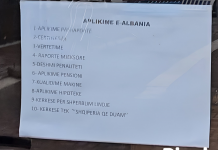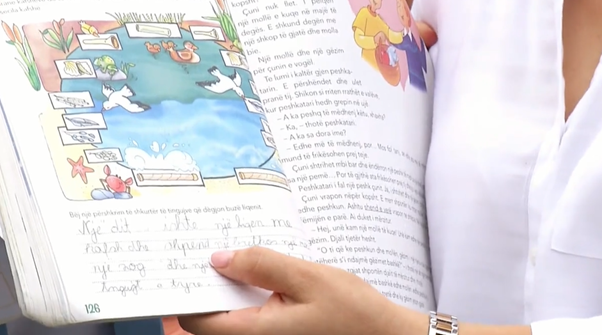A few months ago, Prime Minister Edi Rama announced that 8,000 female heads of households would benefit from social programs. Faktoje confirmed that the support includes recognition of childcare as work experience, with its impact on female heads of households becoming apparent upon reaching pension age. While the statement holds true in terms of numbers, it highlights the need for the government to shift its mindset and provide comprehensive and tangible packages to empower female heads of households.
Last November, Prime Minister Edi Rama revealed that 8,000 female heads of households with three or more children would be eligible for benefits under social protection programs outlined in the 2024 budget.
‘Over 8,000 female heads of households with three or more children under the age of 18 will benefit from social protection programs’ wrote the head of government in a social media post on November 19th.

| More than 8,000 female heads of households with three or more children up to the age of 18 will benefit from social protection programs
|
Screenshot of Prime Minsiter Rama’s post
Following this declaration, we conducted an investigation to ascertain the benefits of this program and the criteria for eligibility.
The new policy aimed at supporting young mothers with multiple children was announced on December 27, 2022, by Ogerta Manastirliu, then Minister of Health and Social Protection. She stated in Parliament that the implementation would start in January 2023.
In November 2023, Albana Koçiu, the Minister of Health and Social Protection, revealed that the budget for the Social Protection Package for the upcoming year amounted to 19.7 billion ALL. This allocation encompassed support for Persons with Disabilities, female heads of households, compensation for former political prisoners, economic assistance, and the baby bonus.
In the announcement made on November 19, 2023, Minister Koçiu explanied the criteria for female heads of households eligible for this support:
‘Unemployed women with three or more children under the age of 18, where one child is under the age of 5, and the family has a monthly gross income of less than 100,000 ALL, qualifying as economically inactive, shall be covered by the mandatory social and health insurance scheme. The financing of their contribution payments will be provided by the state budget, for the childcare period up to the age of 5.’
Although the State Social Service did not respond to Faktoje’s official requests regarding the number of beneficiaries from this initiative, economic expert Teuta Nunaj confirms that the number of eligible female heads of households is 8,000, as stated by the Prime Minister.
However, the initiative he promoted seems to be part of wider social policies that governments generally implement to assist vulnerable groups, particularly women, and is rooted in citizens’ rights to social support.
‘For 2024, it is anticipated that there will be 8,000 beneficiaries, compared to 5,580 women who received benefits in 2023. Social support involves the payment of social and health insurance contributions for the childcare period up to 5 years old,” Nunaj further elaborates by saying:
‘The payment of social insurance contributions means that for this demographic, caregiving for children within the family shall also be recognized as work experience when they reach retirement age. In this scenario, the assistance provided is twofold, encompassing both the payment of social and health insurance contributions and the acknowledgment of work experience.
Kumrije Zika, a female head of household and mother of 3 children, does not qualify for support from the social protection program because she does not meet two criteria: none of her children are under the age of 5, and she is employed.
‘I have 3 children, aged 17, 14, and 12, and I have not benefited from the social protection program. I am also employed because I need to support my family with income,’ says Zika. Even if she were to meet the criteria, she would not feel immediate financial or economic effects now, but only after retiring.
Social support cannot be achieved with incomplete measures
Economic expert Eduart Gjokutaj suggests some options for effectively assisting female heads of households and those in need.
‘Women seek opportunities not just to survive and receive pity, but opportunities where they can have an impact and make a difference. What applies to the entire job market also applies to female heads of households, for whom conditions need to be created through cooperation and commitment between the government and the private sector to enable the choice of flexible working hours and provide more opportunities to work from home, where work processes can be integrated with this approach,’ suggests the expert.
According to him, solutions can be achieved through a different mindset than the current one.
‘After conducting a thorough analysis and comprehensive update of the labor market, demand, and supply, the government, in collaboration with businesses at all levels, should develop comprehensive and proactive support packages aimed at achieving the following objectives:
-Introduce a package that fosters professional development through subsidized training programs;
-Provide fiscal and economic incentives for businesses to adopt policies aligned with the established objectives;
Allocate social funds for childcare and other family needs to alleviate women from the multiple burdens of time and financial constraints;
Establish a continuous information and education campaign to raise awareness among both the market and individuals, shifting away from a culture of pity-driven economic assistance towards policies that promote the development and empowerment of female heads of households, particularly focusing on their health and age-related concerns.
This model, as proposed by the expert, not only relieves the budget from inadequate social assistance but also mobilizes resources for the labor market, which is in dire need of reinforcement.
Social programs are not promoting childbirth either
One of the indicators that supports the expert’s conclusion about the inadequacy of social support programs is the decrease in birth rates in Albania. According to Eurostat, in 2022, Albania had the lowest fertility rate for women, ranking only behind Spain and Malta.
Even INSTAT data shows that in 2022, the fertility rate dropped to 1.21 children per woman of reproductive age, down from 1.32 in 2021. This marks the most significant decline since 2015.

Conclusion
Faktoje’s verification, along with consultations with experts, validates the figures declared by the Prime Minister regarding the 8,000 female heads of households benefitting from the social support program. However, this declaration seems to serve more as propaganda than offering concrete assistance, as its impact appears delayed, leaving crucial issues unresolved, particularly regarding food security and access to basic services.
To effectively tackle these challenges, the expert suggests a strategy involving a shift in the mindset of state institutions and the formulation of comprehensive support packages tailored to the needs of these vulnerable segments of society.










